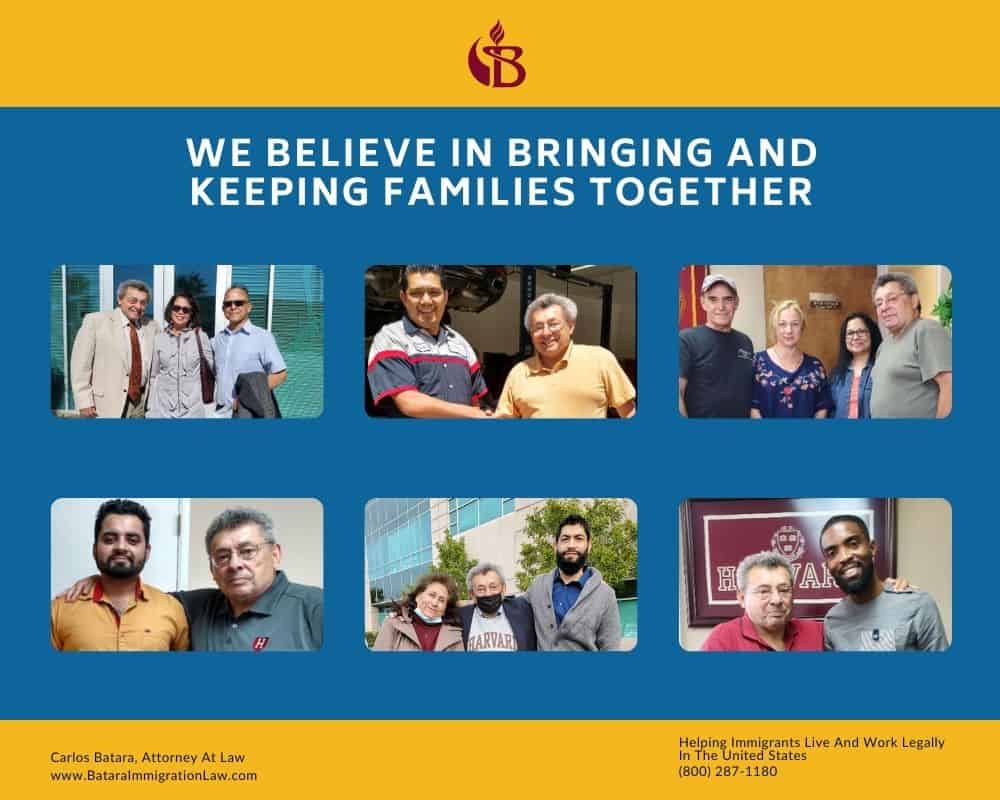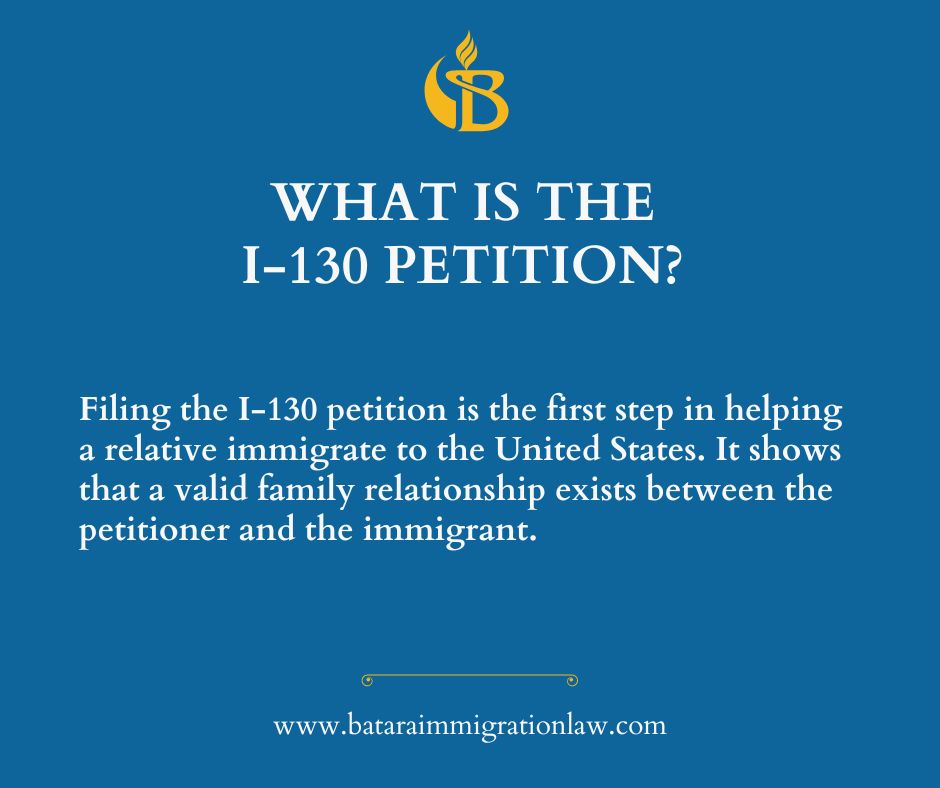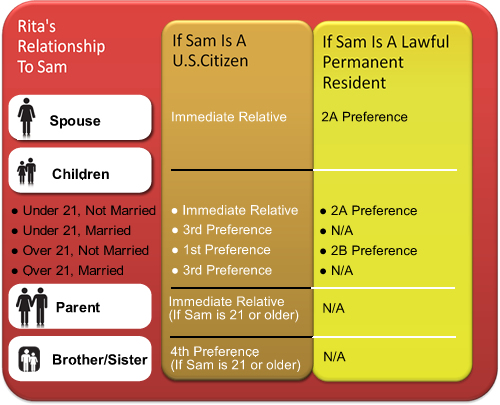
Whether It’s Your Husband, Wife, Child, Parent, Brother or Sister . . .
We’ll Help You Navigate The Family Visa Process From Start To Finish.
In this article, Immigration Attorney Carlos Batara explains how the I-130 family visa and petition process works, who you can sponsor for immigration benefits, and what you need to know about the different requirements for various family members – to improve your chances for success.
You’re here for a reason . . . your family is important to you.
You want to sponsor them to live with you in the United States.
You want to help them become permanent residents.
And we’re here to help you achieve those goals.
Some U.S. citizens and permanent residents think filing the I-130 petition is an easy task without complications. This is a dangerous assumption. It can lead to delay in bringing your loved one to this country, as well as additional fees and costs. Worse, it can lead to denial of your relative’s visa.

Table Of Contents
- Immigrant Visa Petitions: The First Step In The Family-Based Green Card Process
- What You Need To Know About I-130 Immigrant Relative Petitions
- How We Help Get Your I-130 Petition Approved
- Preparing And Filing The I-130 Petition
- Visa Petition Beneficiaries: Immediate Relatives Or Family Preference Relatives?
- Immediate Relatives Of U. S. Citizens
- Family Visa Preference Beneficiaries
- Tips To Avoid Mistakes, Delays, And Problems
- USCIS Reviews The I-130 Petition
- USCIS Approves The I-130 Petition
- How Long Does The I-130 Petition Approval Take?
- Frequently Asked Questions About The Immigrant Petition Process
- What If The I-130 Petition Is Denied?
Immigrant Visa Petitions: The First Step In The Family-Based Green Card Process
You want to help your family live and work legally in the United States.
But you’re not sure how to make this happen – or where to begin.
With so much at stake, why guess?
Guessing is not the way to find the best solution.
Your efforts to bring – or keep – your loved ones together can be torpedoed before they really get off the ground. Miscues, mishaps, and missteps on immigrant relative petitions can lead to long delays, increased costs, or worse.
Naturally, you’re concerned.
You’re afraid to make mistakes which might harm your family members.
For example:
√ You heard neighborhood gossip. You want to file a family petition for your elderly mother. Her tourist visa expired a few years ago. She has been living with you and your husband. You were told by a neighbor that you are not allowed to immigrate your mother. You are not sure if you can believe such advice.
√ You were told there is no chance to win. You want a family visa for your son. You went to the office of an immigration consultant to fill out a petition to immigrate him. She told you that you cannot help him because he is 21 and married. You feel hopeless. You do not know if you should just give up or keep fighting.
√ You fear deportation of loved ones. You want to sponsor your husband. He had papers filed by his ex-wife several years ago. They divorced. His I-130 spousal petition was cancelled. You read a story about a person who was arrested after he filed green card papers and went to an interview without his new spouse. He was then sent to immigration court and deported. You worry the same thing might happen to your spouse.
Making immigration family unity decisions based on fear is the worst thing you can do.
That’s where our experience in handling family-based immigration petitions comes in. We can help you figure out which relatives you can help – and which ones you cannot help.
What Your Family Needs To Know About
I-130 Immigrant Relative Petitions
Unfortunately, U.S. citizens and permanent residents sometimes make costly and time-wasting mistakes when they petition relatives to join them here in the United States.
These problems can and do arise in a variety of situations – including when immigrants try to help themselves, when they listen to the advice of friends, when they enlist the services of non-attorneys, and even when they hire the wrong lawyer.
The consequences can be disastrous.
- Take Richard, a college graduate from Nigeria, living in San Bernardino. He had been married to his second wife for five years. They had two young children. Since both he and his spouse were well-educated, they filed the I-130 petition to immigrate Richard on their own. It was denied. On the basis of a flawed petition filed by his first wife several years before, causing the government to suspect immigration fraud. This is not an unusual problem which trips up many immigrants who have remarried.
- Bonifacio, a Filipino immigrant trained as a chef in the Philippines, and his wife, ran a small restaurant in the Riverside area. Because they supported small businesses, they hired a non-lawyer legal assistant to handle the I-130 paperwork needed for to begin Omar’s green card process. The petition was filled out inaccurately, without incomplete information. They did not learn about the deficiencies until he was served with a Notice To Appear at immigration court to face deportation charges. Such errors are not uncommon in notario-prepared immigration paperwork.
- Alejandro from Guatemala had hired a lawyer whose ads he had on television and heard on the radio over and over again. Over 2 1/2 years later, he visited out San Bernardino immigration law office. He was exasperated because he could not reach his lawyer to talk about the status of his case. At first, his advisor, who may or may not have been a licensed attorney, seemed like a friend, but now it seemed the advisor faked the commitment to helping immigrant families. Alejandro had just returned back to the U.S. from seeing his wife and children, and he was feeling a sense of guilt as one of the last things his 4-year son had said was “When can we go with you, Dad?”
Such missteps often prohibit family members from ever being able to live together with their sponsors.
However, you don’t have to suffer this fate.
As Your Family Visa Attorney, We Help Get Your Family-Based I-130 Petition Approved
We’re here to help you avoid such setbacks – and to guide you and your family members through the visa process from start to finish.
So that they can live and work legally in the United States.
Let’s get started with the details of your family member’s journey to green card success.
A. Preparing And Filing The I-130 Immigrant Visa Petition
The first step of the visa process is to complete and submit Form I-130.
Your petition must be supported with evidence to establish what immigrant relatives you can sponsor for a green card.
You must show:
- Whether the petitioner is a U.S. citizen or lawful permanent resident
- Where the beneficiary will attend the green card interview (in the U.S. or their home country)
- What type of family relationship bonds the petitioner and beneficiary (i.e., husband – wife, parent – child, brother – sister)
Visa Petition Beneficiaries: Immediate Relatives Or Family Preference Relatives?
Family members you can sponsor are divided into two classifications. Immediate relatives of United States citizens. Family preference relatives of U.S. citizens or lawful permanent residents.
Here’s a short tip on terminology.
- If you are sponsoring someone for a visa, you are considered the petitioner.
- The relative whom you are sponsoring is deemed the beneficiary.
- Beneficiaries are classified as either immediate relatives or family preference relatives.

Immediate Relatives Of U. S. Citizens
If you’re a U. S. citizen, certain relatives you petition are classified as “immediate relatives”.
This label only applies to beneficiaries of U.S. citizens – but it does not apply to all beneficiaries of U.S. citizens.
Here is the main advantage for beneficiaries who are immediate relatives.
Immediate relatives are not subject to the limits on the amount of immigrant visas given out each year. This means they will be able to file for a green card without a long waiting period – and usually they will get their green card interviews scheduled more quickly than family preference relatives, often far more quickly.
So which family members of U.S. citizens are immediate relatives?
Only (a) immigrant spouses, (b) unmarried immigrant children, under the age of 21, and (c) immigrant parents of children over 21.
Family Visa Preference Beneficiaries
The other eligible relatives of U. S. citizens are placed into the immigration family-based preference system.
The same is true of those family members who can be petitioned by lawful permanent residents.
Unlike immediate relatives, family preference beneficiaries are subject to the annual visa quotas. This often leads to long visa waits, especially for immigrants from countries where the number of people who apply each year exceed their country’s visa numerical limits.
Family preference beneficiaries are divided into four categories.
Each category has a different waiting period. If your relatives are in a higher preference category, they will normally be able to file for a green card sooner than those in a lower category.
For example, if your relative is in the First Preference category, his papers will usually move faster than your relatives in the Second, Third, or Fourth Preference categories.
The lower the category, like Third or Fourth Preference, means the longer an immigrant will need to wait before he is entitled to a green card interview.
All of your legal documents, such as birth certificates and marriage certificates, must be properly certified by a court or government agency. If any of your documents are in a foreign language, they must be officially translated, as well as properly certified by the appropriate courts or agencies in your home country.
Although the I-130 questions seem straight-forward, your answers should not be given in a light-hearted manner. They can lead to complicated legal issues not apparent on the surface of the form.
I-130 Petition Preparation Tips To Avoid Mistakes, Delays, And Problems
As your family visa attorney, my office always follow a few simple rules to avoid hidden complications.
We never file an I-130 petition unless we have conducted a complete interview with both the petitioner and beneficiary.
Some clients call our office asking if we can review their petitions for them before they file them. Our office refuses to do so. Merely asking a few quick questions and obtaining a few quick answers is like the blind leading the blind.
We never file an I-130 family visa petition if we have any doubts about the accuracy of a petitioner or a beneficiary’s answers.
It is wiser to delay filing the I-130 to investigate discrepancies and clarify inconsistencies before paying your fees and submitting your petition.In some cases, we have to do background checks for arrest records, divorce documents, criminal convictions, and past immigration history.
Clients who have sought our services after they went forward on their own, often do so after they learn an assumption of theirs was wrong. Like a previous divorce which was never finalized, meaning they are not divorced and, worse, that their current marriage is invalid.
We never file an I-130 if we suspect any of the information is false or deceptive.
At times, clients visit our office after they discover errors made by others who had helped them. This occurs far too frequently when clients trusted their papers to a legal services office, only to find out the documents were were improperly filed by a notario or paralegal, who omitted or falsified important details.In these types of situations, we can sometimes correct the problems. But not always. If the government suspects immigration fraud, it can lead to the relative you’re attempting to sponsor being arrested and deported.
B. USCIS Reviews The I-130 Family-Based Immigrant Relative Petition
Once the government receives the I-130 immigrant relative petition, it begins the review process. The agency which goes over your documents is known as the U.S. Citizenship And Immigration Services (USCIS).
Previously, the petition could only be filed through the mail. Recently, the government announced that I-130 petitions can now be filed electronically.
There are no local immigration offices for submission purposes, whether filing the 1-130 petition electronically or by standard U.S. mail.
At this point, certain stumbling blocks may arise. Normally, problems stem from incomplete packages of supporting evidence. Such errors include:
- A missing or illegible signature or document
- Lack of proper government certification for a birth, death, marriage, or divorce certificate
- Payment of incorrect filing fees or inconsistent information listed on the petition
- Using wrong-colored ink, highlighters, or correction tapes and liquids
- Submission of of wrong or outdated forms
- Failure to completely fill in all parts of the required forms
USCIS may return the entire package to you. Other times, the agency will send you a Request For Evidence, a document which pinpoints what evidence they’re questioning.
After you comply with their request for additional information, the government will continue processing your petition, If there are no major legal problems, your petition will move to the next stage.
C. USCIS Approves The I-130 Immigrant Relative Visa Petition
After USCIS reviews the I-130 and finds the petitioner has met all the requirements, it issues an Approval Notice.
Some immigrants are confused about the meaning of an approved I-130 petition. The main purpose is that it shows you have a valid relationship to immigrate your family member.
For instance, if you’re attempting to petition your wife for green card benefits, it only serves to show that your marriage is technically legal
It does not confer permanent residency benefits upon the beneficiary. It does not provide an immigrant with employment authorization.
But the good news is that you can now move to the next stage in the green card process.
How Long Does The I-130 Immigrant Relative Petition Approval Take?
Generally, the waiting time for an Approval Notice of an I-130 immigrant relative visa petition is about five months.
Some petitions are approved more quickly. Others take more time.
Yet, as noted above, the filing of the I-130 immigration family visa petition is merely the first step of the complete family unity legalization process.
Helping a relative win the right to live and work in the U.S. is a two-step endeavor.
As a result, after your immigrant visa petition has been approved, you’ll still need to move to the second step of the family-based green card process – filing your application for permanent residence.
Frequently Asked Questions About The Immigrant Petition Process
Often, petitioners and their immigrant relatives are confused about various aspects of their relationship, such as:
What If The I-130 Petition Is Denied?
Do not underestimate the subtle complexity of the I-130 visa petition process.
Too many people lose their cases because they made mistakes that could have been avoided, that should have been avoided.
(Such outcomes are most prevalent in I-130 petitions to sponsor a spouse.)
As a result of losing, immigrants are often sent to immigration court to face deportation charges. Husband and wife, parent and child face separation, perhaps forever.
In many instances, the negative decisions can be reversed. An I-130 immigration relative petition denial can be fought and overcome.
If your I-130 petition to immigrate close family members is denied, you must file an appeal with the U.S. Citizenship and Immigration Services office which issued the decision.
But you must act quickly. Generally, you are only given 30 days to challenge the negative USCIS decision, to protect your rights to fight back.
Ready to take a serious and honest look at the strengths and weaknesses of your immigration case? Let’s get started with a personalized strategy and planning session . . .




